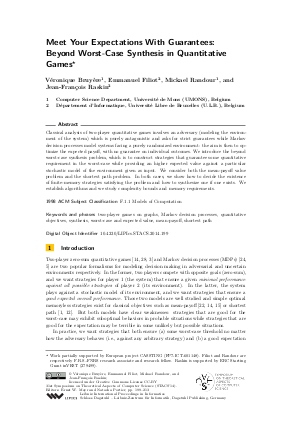Meet Your Expectations With Guarantees: Beyond Worst-Case Synthesis in Quantitative Games
Authors Véronique Bruyère, Emmanuel Filiot, Mickael Randour, Jean-François Raskin
-
Part of:
Volume:
31st International Symposium on Theoretical Aspects of Computer Science (STACS 2014)
Part of: Series: Leibniz International Proceedings in Informatics (LIPIcs)
Part of: Conference: Symposium on Theoretical Aspects of Computer Science (STACS) - License:
 Creative Commons Attribution 3.0 Unported license
Creative Commons Attribution 3.0 Unported license
- Publication Date: 2014-03-05
File

PDF
LIPIcs.STACS.2014.199.pdf
- Filesize: 0.82 MB
- 15 pages
Document Identifiers
Subject Classification
Keywords
- two-player games on graphs
- Markov decision processes
- quantitative objectives
- synthesis
- worst-case and expected value
- mean-payoff
- shortest path
Metrics
- Access Statistics
-
Total Accesses (updated on a weekly basis)
0PDF Downloads0Metadata Views
Abstract
Classical analysis of two-player quantitative games involves an adversary (modeling the environment of the system) which is purely antagonistic and asks for strict guarantees while Markov decision processes model systems facing a purely randomized environment: the aim is then to optimize the expected payoff, with no guarantee on individual outcomes. We introduce the beyond worst-case synthesis problem, which is to construct strategies that guarantee some quantitative requirement in the worst-case while providing an higher expected value against a particular stochastic model of the environment given as input. We consider both the mean-payoff value problem and the shortest path problem. In both cases, we show how to decide the existence of finite-memory strategies satisfying the problem and how to synthesize one if one exists. We establish algorithms and we study complexity bounds and memory requirements.
Cite As Get BibTex
Véronique Bruyère, Emmanuel Filiot, Mickael Randour, and Jean-François Raskin. Meet Your Expectations With Guarantees: Beyond Worst-Case Synthesis in Quantitative Games. In 31st International Symposium on Theoretical Aspects of Computer Science (STACS 2014). Leibniz International Proceedings in Informatics (LIPIcs), Volume 25, pp. 199-213, Schloss Dagstuhl – Leibniz-Zentrum für Informatik (2014)
https://doi.org/10.4230/LIPIcs.STACS.2014.199
BibTex
@InProceedings{bruyere_et_al:LIPIcs.STACS.2014.199,
author = {Bruy\`{e}re, V\'{e}ronique and Filiot, Emmanuel and Randour, Mickael and Raskin, Jean-Fran\c{c}ois},
title = {{Meet Your Expectations With Guarantees: Beyond Worst-Case Synthesis in Quantitative Games}},
booktitle = {31st International Symposium on Theoretical Aspects of Computer Science (STACS 2014)},
pages = {199--213},
series = {Leibniz International Proceedings in Informatics (LIPIcs)},
ISBN = {978-3-939897-65-1},
ISSN = {1868-8969},
year = {2014},
volume = {25},
editor = {Mayr, Ernst W. and Portier, Natacha},
publisher = {Schloss Dagstuhl -- Leibniz-Zentrum f{\"u}r Informatik},
address = {Dagstuhl, Germany},
URL = {https://drops.dagstuhl.de/entities/document/10.4230/LIPIcs.STACS.2014.199},
URN = {urn:nbn:de:0030-drops-44589},
doi = {10.4230/LIPIcs.STACS.2014.199},
annote = {Keywords: two-player games on graphs, Markov decision processes, quantitative objectives, synthesis, worst-case and expected value, mean-payoff, shortest path}
}
